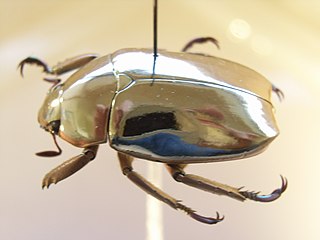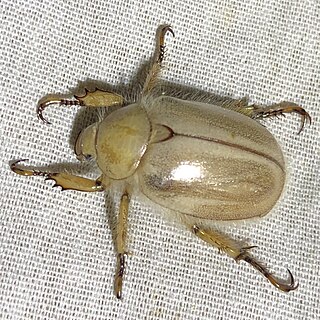
Chrysina, or jewel scarabs, is a genus of brightly colored, often metallic iridescent species of ruteline beetles. They range from the southwestern edge of the United States, through Mexico and Central America, and as far south as Colombia and Ecuador. Chrysina contains more than 120 species, includes all those formerly in the genus Plusiotis. The genus name is from Greek χρύσινος (chrysinos), "gold-coloured".

Ataenius is a genus of aphodiine dung beetles in the family Scarabaeidae. There are at least 290 described species in Ataenius.
Canthidium is a genus of dung beetles in the family Scarabaeidae. There are at least 170 described species in Canthidium.

Chrysina resplendens is a scarab beetle found in mid-elevation forests in Costa Rica and western Panama. This beetle is typically shiny golden and has a length of 25–29 mm (0.98–1.14 in).

Hoplia is a genus of monkey beetles in the family Scarabaeidae. There are at least 300 described species in Hoplia. These species are found in Asia, Europe, South Africa, Madagascar, and the Americas.

Chrysina limbata is a species of scarab beetle found only in mid-altitude forests in Costa Rica and western Panama. It is in the genus Chrysina, in the subfamily Rutelinae. It is notable for its metallic reflective silver color.

Rutelini is a tribe of shining leaf chafers in the family Scarabaeidae. There are about 14 genera and at least 40 described species in Rutelini.

Macrodactylus, known as rose chafers, are a genus in the family Scarabaeidae. There are at least 110 described species in Macrodactylus.

Eupariini is a tribe of aphodiine dung beetles in the family Scarabaeidae. There are about 12 genera and at least 80 described species in Eupariini.
Rutela formosa, the handsome flower scarab, is a species of shining leaf chafer in the family of beetles known as Scarabaeidae.

Pseudocotalpa sonorica is a species of shining leaf chafer in the family of beetles known as Scarabaeidae. It is endemic to the Algodones Dunes in North America.

Chrysina lecontei, or Leconte's chrysina, is a species of shining leaf chafer in the family of beetles known as Scarabaeidae. It is found in southern United States and northern Mexico.
Pseudocotalpa andrewsi, known generally as the Andrews dune scarab beetle or Andrews dune beetle, is a species of shining leaf chafer in the family Scarabaeidae. It is endemic to the Algodones Dunes in California.
Pelidnota lugubris is a species of shining leaf chafer in the family of beetles known as Scarabaeidae.
Diplotaxis beyeri is a species of scarab beetle in the family Scarabaeidae. It is found in Central America and North America.
Parastasia brevipes is a species of shining leaf chafer in the family of beetles known as Scarabaeidae.
Cotalpa conclamara, the Texas goldsmith beetle, is a species of shining leaf chafer in the family Scarabaeidae.
Paracotalpa ursina is a species of shining leaf chafer in the family of beetles known as Scarabaeidae.
Gymnetina is a genus of fruit and flower chafers in the family of beetles known as Scarabaeidae. There are about six described species in Gymnetina.

Chrysina woodi, or Wood's jewel scarab, is a species of shining leaf chafer in the family of beetles known as Scarabaeidae. This bright green beetle is native to Chihuahua in Mexico, and New Mexico and Texas in the United States. This beetle is 25–35 mm (1.0–1.4 in) long and it resembles C. beyeri, but that species has all blue-purple legs and tarsi.









